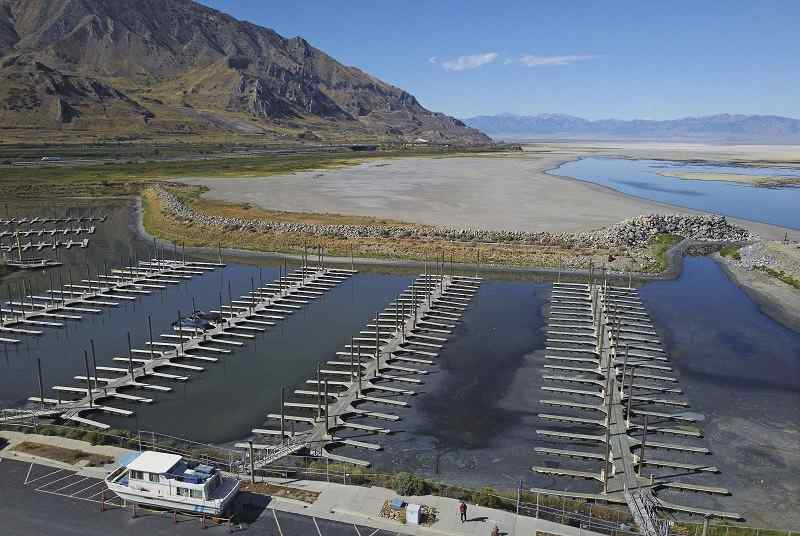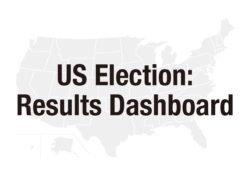In fast-warming Nevada, climate bill may not lift Democrats

Empty boat docks are viewed at the Great Salt Lake Marina, Friday, Aug. 26, 2022, near Salt Lake City.
13:09 JST, August 29, 2022
LAS VEGAS – About a week after President Joe Biden signed into law the largest climate bill in U.S. history, Sen. Catherine Cortez Masto, D-Nev., laid out to voters here how she helped get $4 billion in the bill to combat the acute drought now punishing the American West. Outside the air-conditioned offices of the Las Vegas Valley Water District where she spoke, the temperature stood at 93 degrees – on its way to an oppressive 106 later that day.
“As you all know, the western U.S. continues to face a historic drought, and we need to do all we can to combat it,” Cortez Masto said Monday, standing before a photo showing the nation’s largest reservoir, Lake Mead, at record lows. “That’s why I have been championing measures to help Southern Nevada further conserve, recycle and reduce water use.”
Cortez Masto – one of the most vulnerable Democratic senators up for reelection this year – has spent recent weeks courting Nevada voters who want leaders in Washington to prioritize the climate crisis. Yet climate change has rarely decided the outcome in congressional races, even in Las Vegas, the nation’s second-fastest warming city in a region experiencing the most extreme drought in 1,200 years.
Voters across the country have consistently ranked the economy and health care as a higher priority than global warming. And if Democrats cannot successfully sell their environmental agenda in Nevada, which has seen a cascade of climate disasters this summer, it’s unclear whether climate concerns will ever become paramount in key national races.
In interviews with more than a dozen voters in the working-class neighborhoods that encircle Las Vegas, most said they were focused on providing for their families amid soaring housing costs and gasoline prices. Few of them brought up climate change or were aware the Inflation Reduction Act provided drought relief.
“I’ve been not buying a lot of things because I can’t afford it,” office worker Melissa Salinas said in an interview outside La Bonita, a Hispanic supermarket in northwest Las Vegas where a gallon of milk costs $4.99, above the national average. “I’m like, ‘The kids don’t need juice for school anymore. We’ll just do water.'”
While Salinas was not familiar with the climate bill, she’s worried enough about the drought that she and her family are considering relocating: “We’ve looked into moving from here because it was just like, ‘Where’s the water going to come from?'”
The signs of climate change are everywhere in Nevada this year. Las Vegas reached a record daily high of 109 degrees on June 10 – so hot that sensors in space picked up the heat. And on the same day that Biden signed the climate bill into law, federal officials informed Nevada policymakers that they must cut the state’s water use from the dwindling Colorado River by 8%, while National Park Service rangers discovered a fifth set of human remains in the receding waters of Lake Mead.
Cortez Masto’s GOP challenger, former Nevada attorney general Adam Laxalt, has said little about the Western drought and supports oil and gas drilling, which is helping drive up global temperatures. He has criticized the Inflation Reduction Act, which no Republicans supported, as “reckless” spending that will “fuel inflation.”
The climate package authorizes the biggest infusion of federal spending yet to tackle global warming – roughly $369 billion to reduce greenhouse gas emissions to 40% below their 2005 levels by the end of this decade. Democrats have said the measure will reduce Americans’ energy costs by providing tax credits for consumers to buy electric vehicles, install solar panels and embrace other climate-friendly technologies.
The bill also sets aside $4 billion for drought mitigation, which will help conserve water in Lake Mead and Lake Powell and pay farmers who voluntarily reduce their water deliveries. Cortez Masto fought to include the drought funding along with Sen. Kyrsten Sinema, D-Ariz., and two other Democratic senators facing tight reelection races: Mark Kelly of Arizona and Michael Bennet of Colorado.
Kelly, a former astronaut who has seen the deforestation of the Amazon rainforest from space, said in an interview that the drought money “has little or nothing to do with the election” and “everything to do with” preventing an environmental catastrophe.
“We can’t allow the Colorado River to get down to dead pool,” Kelly said, referring to when key reservoirs drop so low they would not be able to produce hydropower.
Seven Western states in the Colorado River basin last week blew past a deadline to reach an agreement on making unprecedented cuts to their water use. The Bureau of Reclamation responded by announcing Arizona must reduce its water supply by 21%, Nevada by 8% and the country of Mexico by 7%. Larger cuts loom in the future.
Laxalt sent a statement on the drought to 8 News Now, a local news outlet, after initially declining to comment on the issue. He endorsed “long-term solutions that take an all-of-the-above approach, including desalination in California and Arizona.”
Cortez Masto has held several events focused on issues besides climate change, including a recent roundtable on how the Inflation Reduction Act will lower prescription drug costs for older Americans.
In her first campaign ad of the general election, however, Cortez Masto accused Laxalt of being bankrolled by large oil and gas companies, a leading contributor to global warming.
“Where you find Big Oil, you’ll find Adam Laxalt,” a narrator says in the ad, as the phrases “Big Oil” and “Adam Laxalt” interlock on a crossword puzzle. “He’s been on their side for years.”
As Nevada’s attorney general from 2015 to 2019, Laxalt opposed efforts by Democratic attorneys general to investigate whether oil companies misled the public about climate change. During his unsuccessful bid for governor in 2018, a super PAC largely funded by oil interests spent $2.5 million to support his run.
In a recording obtained by The Washington Post, Laxalt told a crowd of supporters that they need to push back on anyone highlighting his ties to Big Oil companies or claiming that those companies are responsible for high gasoline prices. (As of Friday, a gallon of gas cost an average of $4.89 in Nevada and $3.87 nationally, according to AAA.)
“You can’t survive an economy where you go to $2 gas to $5.50, $6 gas,” Laxalt said in the recording of the Southern Hills Republican Women luncheon in late July. “And who is responsible for it? We all know it is not [Russian President Vladimir] Putin. And it is not greedy oil executives. And it is certainly not the private citizen.”
A spokesman for Laxalt’s campaign, Brian Freimuth, blamed high gas prices on Democrats. “Biden Masto policies are the reason that energy prices have skyrocketed and Nevada voters are demanding change,” Freimuth said in an email.
In recent weeks, Cortez Masto’s campaign has also run two ads touting her efforts to include funding for wildfire management and prevention in last year’s bipartisan infrastructure law.
“Catherine has been a vital partner to the fire service, and we know that we have her full support,” Reno Fire Chief Dave Cochran says in one of the ads, which shows firefighters battling a wall of orange flames during last year’s destructive fire season.
Laxalt has attributed recent blazes to poor forest management rather than global warming, though a growing body of research shows climate change has increased wildfires’ frequency and intensity.
“Adam believes that proper forest management is essential to preventing the spread of dangerous wildfires and has emphasized his intention to fully support the brave officials working to protect Nevada lands,” Freimuth said.
Some Democratic strategists remain optimistic that the drought money will help boost turnout for Cortez Masto – especially among the working-class and Latino voters who have formed the core of the Democratic machine built by the late Senate Majority Leader Harry Reid of Nevada.
“I think it will resonate with Nevadans who are sick of seeing inaction on things like climate change and drought,” said Megan Jones, a Nevada operative working with the Democratic-aligned Senate Majority PAC.
Cortez Masto, the only Latina ever elected to the Senate, has sought to bolster her standing with Hispanic voters, a demographic that Biden won by 26 percentage points in the state in 2020. Her campaign started running Spanish-language ads in March and recently hosted a boisterous party at a community center with tables for Latin American countries and Mexican states.
Laxalt’s campaign has unveiled its own strategy – dubbed “Latinos for Laxalt” – aimed at countering this approach.
In theory, Cortez Masto’s climate pitch should resonate with Latinos, who are more vulnerable to climate impacts than many Americans. Nationwide, Latinos are 43% more likely than others to lose work hours and pay because of extreme heat, according to a report released last year by the Environmental Protection Agency. In Florida, Latino immigrants from Central and South America have collapsed from heatstroke while working at plant nurseries on especially hot days.
Yet Obed Castaneda, a part-time graphic designer and Uber driver, said he probably won’t vote in the midterms because he doubts it would make a difference. He, too, had not heard of the $4 billion for drought mitigation in the climate bill.
Castaneda said many voters in Las Vegas are too busy working, whether at the bustling casinos on the Strip or other businesses around town, to pay attention to politics. He joked that the billboards on the Strip – whose neon letters advertise the newest concerts, comedy shows and gentleman’s clubs – should instead spread awareness about the drought funding to residents.
“I want to see a freakin’ billboard down the freakin’ Strip,” he said. “You got that much money? Let’s see it.”
Young voters, who consistently rank climate change as a higher priority, account for 29.5% of registered Nevada voters and could play a key role in the race.
But Cortez Masto may not get much help from youth climate activists. The Las Vegas chapter of the Sunrise Movement, a key advocacy group, has declined to endorse her because she does not support the Green New Deal, the liberal proposal to eliminate the nation’s fossil fuel use within a decade.
Still, Dexter Lim, a 19-year-old co-founder of the chapter, said he prefers Cortez Masto to Laxalt, given her stronger support for renewable energy.
“Of course we have to support her in this race because the alternative is much, much worse,” Lim said.
"News Services" POPULAR ARTICLE
JN ACCESS RANKING







